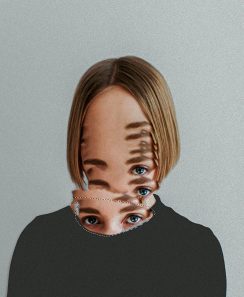PSYCHOTIC DISORDERS
Psychotic disorders are a group of mental health conditions characterized by the presence of psychotic symptoms. Psychosis refers to a range of experiences that involve a disconnect from reality, including hallucinations (perceiving things that are not actually present) and delusions (holding false beliefs that are resistant to reasoning). These symptoms can significantly impact a person's thoughts, emotions, perceptions, and behavior, leading to a diminished ability to function in daily life.

Common psychotic disorders include:
- Schizophrenia: This is one of the most well-known psychotic disorders. It involves a range of symptoms such as hallucinations, delusions, disorganized thinking and speech, and negative symptoms like reduced emotional expression and motivation.
- Schizoaffective Disorder: This disorder combines symptoms of schizophrenia with mood disorder symptoms, such as depression or bipolar disorder. Individuals with schizoaffective disorder experience periods of psychosis along with mood disturbances.
- Bipolar Disorder with Psychotic Features: People with bipolar disorder can experience episodes of mania or hypomania (elevated mood) and depression, and during severe episodes, they may also experience psychotic symptoms.
- Delusional Disorder: This involves persistent delusions that are not accompanied by significant hallucinations or other major mood or cognitive disturbances.
- Brief Psychotic Disorder: Individuals with this disorder experience a sudden onset of psychotic symptoms that last for a short period of time, often triggered by extreme stressors.
- Psychotic Depression: Severe depression accompanied by psychotic symptoms, such as hallucinations or delusions.
Neurodiversity is a concept that emphasizes the acceptance of neurological differences as a natural part of human diversity. It suggests that conditions like autism, ADHD, dyslexia, and others should be viewed as variations in brain function rather than simply as disorders that need to be "fixed." The intersection between psychotic disorders and neurodivergence can be complex.
When providing treatment for psychotic disorders with neurodivergent clients, the approach can differ significantly based on the individualized processing of medication, therapy, and somatic experiences within their unique cognitive frameworks. The Neurodivergent Collective adopts a universal approach for all individuals, incorporating empathy, respect, and an appreciation for their distinct lived experiences. Important considerations at this intersection include:
- Holistic Understanding: Recognize that individuals with psychotic disorders are not defined solely by their symptoms. They have a range of experiences, strengths, and challenges that should be acknowledged.
- Support and Accommodation: Just as neurodiversity advocates for accommodating the needs of individuals with conditions like autism, similar considerations should be extended to individuals with psychotic disorders to ensure they have access to appropriate support and accommodations.
- Destigmatization: Reducing the stigma surrounding mental health conditions, including psychotic disorders, is crucial. This helps create an environment where individuals feel safe seeking help and sharing their experiences.
- Individualized Approach: Every person's experience with a psychotic disorder is unique. It's important to recognize and respect their preferences for treatment, coping strategies, and disclosure.
In summary, while psychotic disorders and neurodivergence are distinct concepts, both emphasize the importance of understanding and supporting individuals with diverse neurological experiences.
DO YOU HAVE A QUESTION?
Send our team a message or call 888.717.9355





